The Renaissance Theatre Company was set up in 1987. It was the brainchild of actors David Parfitt and Kenneth Branagh, who had met at a West End Theatre show in the 1980s.
Parfitt had started out as a child actor in the 1970s, while Branagh was the high-flier who had marched out of RADA straight into the West End with Another Country. He was the great young hope of British Theatre, a star in the ascendant and he and his then wife, Emma Thompson, were tipped as a golden couple: the new Oliviers.
Both Branagh and Parfitt were highly dissatisfied with the position of young actors. They regarded the Thatcher government of the time as philistine, and its re-election in 1983 and 1987 as a disaster for the arts. Theatre seemed to be a hierarchy in which young actors had no influence or opportunity. ‘We had no control over our careers. It was about taking control,’ recalled Parfitt.
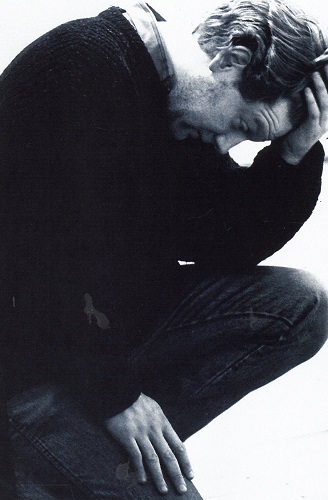
Kenneth Branagh. Archive reference: DSH2/3/4
Branagh had already been considering this situation while engrossed in his first season for the RSC. At the age of 23, to considerable critical acclaim, he had played the youngest Henry V in the Company’s history – but was not invited back for a further contract, nor did the National Theatre or any of the other major theatres show much interest in him.
In discussion with Parfitt, he conceived the idea of a company which would constitute a re-birth in British theatre. It would be based on a camaraderie of equals and a lack of hierarchy, reviving the rare species of the actor-manager and the man wearing several hats. Any one of the Company might act, direct, produce or perform all three functions at the same time. ‘It’s a very honourable tradition’ stated Branagh. ‘After all, it’s been going on for 400 years.’
Clear and comprehensible speaking of Shakespearean text, accessibility to the play and naturalistic performance would be priorities, while staging would be simple, direct and as close to Elizabethan practice as possible. ‘Emphasis should be on the story’ said Branagh, ‘rather than bringing in motor bikes and swimming pools and all that.’ He also favoured escaping the bright lights of London and playing as widely as possible in the regions.
There was to be no subsidy from the Arts Council, no permanent home for the Company and the prospect of operating on a financial tightrope was daunting. But with the help of a group of ‘angels’: fellow-actors, writers, kindred spirits and with financial contributions from the founders themselves, the Renaissance Theatre Company was launched in 1987. Branagh commented:
We’re not out to rip anyone off, we’re not out to make ourselves millionaires by the end of the year, so we don’t have huge profit margins. Our budgeting is designed to make the thing pay for itself… I know people are going to ask who the hell do I think I am to set up like this? I keep asking myself if I’m on a megalomania trip.
Along with two contemporary plays, Twelfth Night directed by Branagh opened the inaugural season at the Riverside Studios, London. It earned reviews which commented on the remarkable resilience and resourcefulness of British theatre, as exemplified by the new Company, and which praised the absence of novel, gimmicky interpretations forced on the actors by a director. It became even more hip when Paul McCartney was approached to compose the music. It was arranged for classical trio and set to the words of Feste’s song.
This promising beginning was followed in 1988 by a touring season entitled Renaissance Shakespeare on the Road. The programme featured three plays of Shakespeare each directed by an established actor making his or her directorial debut. Judi Dench and Geraldine McEwan were to direct Much Ado About Nothing and As You Like It respectively, with Branagh playing Benedick and Touchstone. Finally, in Elsinore itself, Derek Jacobi was to direct Branagh as Hamlet.
The Company initially played for three months at the prestigious Birmingham Repertory Theatre at the invitation of its artistic director, John Adams. In return for a share of the Box Office, it used the space and facilities of the studio theatre, constructing a single set for the entire programme. Judi Dench’s Much Ado was ‘one of the most wonderful productions I have ever seen’ according to the Birmingham Post’s theatre critic.
Geraldine McEwan, directing for the first time at the age of 56, spoke of the trust and daring of Branagh in inviting three performers, several years older, to make their debut. Her As You Like It was acclaimed for its gentle, Edwardian setting and Branagh’s Hamlet drew praise for its intensity within the intimate space of a studio theatre. Branagh delivered a barn stormer and was described as pacing like a caged animal, full of torment and ferocity.
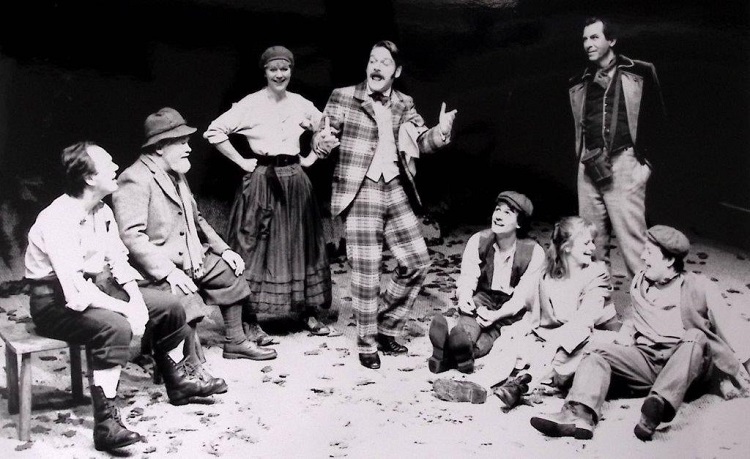
A scene from As You Like It. Archive reference: DSH2/4/3
With apparently unanimous critical acclaim and its credentials established, the Company embarked on its nine-month tour across the UK and Ireland, playing at the Grand Opera House in Branagh’s hometown, Belfast, and then at Kronborg Castle, Elsinore. Their Hamlet gained advantage from the long tradition of being performed in the open air at the castle. In addition, the then Prince Charles, their patron, was to attend. When preparing to play Hamlet, Branagh had secured a meeting with Charles in order to understand the isolation and responsibilities of royal life and the two had become friends. Again, the reviews were outstanding, and the venue proved particularly effective with the footlights casting huge shadows against the castle wall; a splendid effect for an audience facing Hamlet alone on stage.
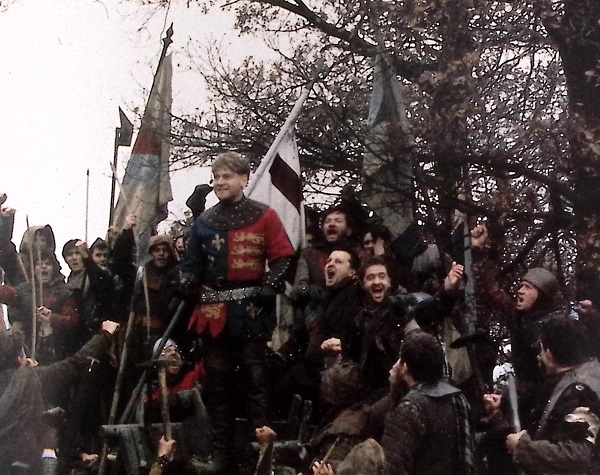
A clip from Branagh's film version of Henry V. Archive reference: DSH2/3/1
By the time the tour reached London for a three months' run at the Phoenix Theatre, a wave of enthusiasm for Shakespeare had built up. It was thrilling to see such style and company spirit in a troupe barely a year old. Branagh capitalised on this popularity by beginning to film Shakespeare’s Henry V, 45 years after Laurence Olivier had done so. He had personally written the script and the filming was finished in seven weeks and under budget. On his debut as film director, he won the Best British Film of the Year award in 1990 and was nominated for Best Actor and Best Director at the 1990 Academy Awards. He would also be attracted into radio and broadcasts of Hamlet, Romeo and Juliet and finally King Lear, with John Gielgud in the leading role, were subsequently offered by the BBC.
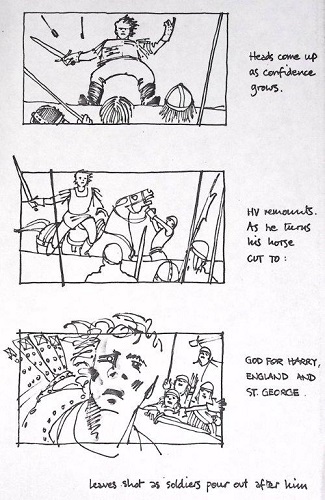
Storyboard from Branagh's film version of Henry V. Archive reference: DSH2/4/1
In 1990, the Company extended its reach by taking King Lear and A Midsummer Night’s Dream to Los Angeles at the Mark Taper Forum. Branagh’s approach to the play was to model Lear (played by Richard Briers) on contemporary leaders familiar in the 1980s and to heighten the sense of political intrigue. In the role of Edgar, Branagh was particularly praised for speaking his lines clearly and comprehensibly, without indulging in poetic frills. The play was performed on a fiery-red oval stage behind which were walls scored with bullet holes.
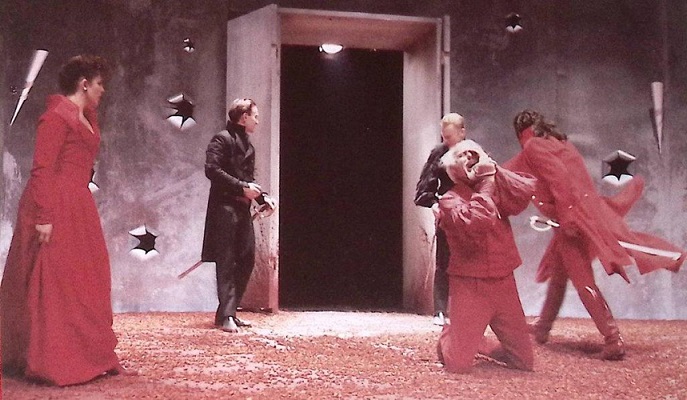
A scene from King Lear. Archive refence: DSH2/3/5
In A Midsummer Night’s Dream, Briers played a much lighter role as Bottom, equipped with traditional Ass’s ears and braying about the stage. Branagh as Quince, the Director of the Mechanicals in the play within a play, sent himself up hilariously as Director of the Theatre Company, wearing jodhpurs, a beret and directing through a megaphone.
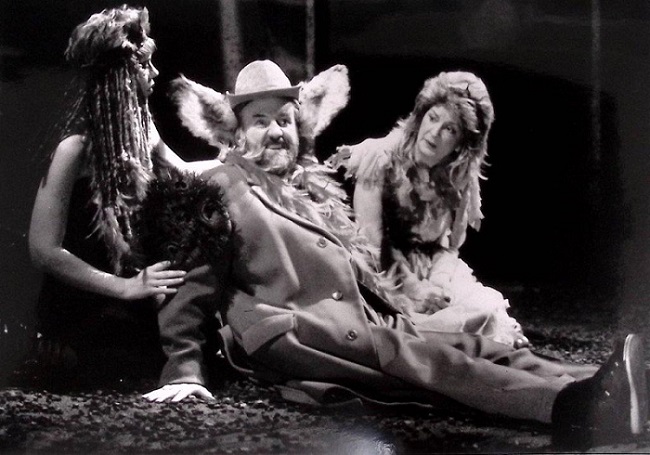
Richard Briers as Bottom in A Midsummer Night's Dream. Archive reference: DSH2/3/5
In the final production of the Renaissance Theatre Company, Branagh played Coriolanus. With his hair slicked back and only a silver breastplate over his torso, he looked thuggish and formidable. His interpretation of the text was bitingly ironic and sarcastic, and the production was praised for its freedom from frills and fanciful directorial concepts: Branagh’s electricity alone resulted in a swashbuckling performance. After its highly successful run, David Parfitt commented that the performance bore out the four-year-old Company’s commitment to making the classics vital and exciting, with passionate acting that could be heard.
The Company disbanded in 1992, to the sadness of its many enthusiasts. It had, however, achieved its purpose and made its mark. Now, following Branagh’s success in Henry V, it was drawn into filmmaking, going on to produce Much Ado About Nothing, Othello, an epic Hamlet and the musical, Love’s Labour’s Lost.
Catalogue record for this collection on CalmView.